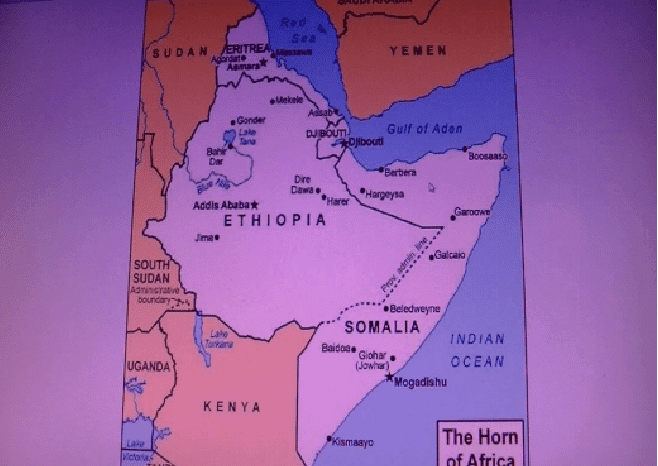
By Dr. Suleiman Walhad
August 5th, 2022
The citizens of the Horn of Africa States have over the years been divided into fake nationalities and in the process, many died, starved, and migrated and many more are still struggling for senseless causes that only cause more harm to the populations the politicians proclaim to be serving. It is the main reason that the Horn of Africa States is on the rise to replace the old structures that have failed the region, and which are used by intruders from beyond as conduits to enter and exploit the resources of the region.
The Horn of Africa States citizens need to be citizens of a region that has to survive in this harsh world and each citizen is required to contribute to the general wellbeing of the region, much like a member of a relay race team assists his team members by doing his/her part well, so that the next team member adds on to his/her work or running and this eventually determines whether the team wins or not.
The current generation of the Horn of Africa States citizen has inherited only trouble, disunity, hunger, discords in the socio-cultural infrastructure and, indeed, underdevelopment from the generations that preceded it. It was those who supposedly freed the continent from European colonialism, but they had no plans and in fact functioned as if they were children who were given new toys to play with. They messed up the countries they were supposed to build and the societies they were supposed to develop, the educational systems they were supposed to improve and the health systems they were supposed to provide. The generation that followed which includes the writer and his peers ended up catching at straws like drowning persons. Some ran, many dying on the way in the deserts and oceans and in other countries of the world, others participated in the killing fields, and died or were maimed and still others continued to play the wrongly toned music.
Those leaders of the past other than hollow sentiments of fake nationalisms, had no plans and could not provide the necessary environments for the next generation to exploit the resources of the region and, in their turn, prepare greener opportunities for the next generation. Nearly seventy odd years of unnecessary suffering continues, and the Horn of African citizen is still being asked to sacrifice more and die for fake entities that has no meaning for anyone. In fact, the countries of the region are more known for their world wrenching problems of hunger, starvation, civil strives, terrorism, piracy, and political failures than any other thing.
When I was a younger man, I used to dream of what I could contribute to the township I grew up in. A small town with a small population but fortunately for me and many others, it did have schools left over from the old colonials and we thrived in those schools. They were, indeed, the foundation of our life processes throughout our careers. To contribute to this small town, now a bigger town with a much larger population, I initiated the concept of a university to be created there and discussed the matter with friends and colleagues at a time of extreme distress and wars in the region and they were surprised and, in fact, many of them questioned my mental state. But because of arduous work, good planning, focus, resilience, and patience and the noble cause the project represented, the university was eventually born as the first community owned regional university in the world and functions well today, producing young professionals in the fields of medicine and healthcare, engineering, business and administration, law, teaching, agriculture and others. The concept was copied from region to region throughout a large space of the Horn of Africa States and decentralization of education has now taken root in the region. In the past most educational institutions, and at least higher educational facilities were concentrated in the capital cities of the region, which is no longer the case.
Just like that university, many of my colleagues also question the concept of the Horn of Africa States and almost include it in the realm of impossibilities and I always ask, why should the Horn of Africa States region be broken down into parts that cannot work together? Why should the people of the Horn of Africa States region not be able to work together, intermingle with each other, travel to each other, trade with each other, join the many educational facilities available in the region, and why should they remain antagonistic to each other when there is no reason to be so?
In the piece on “The Horn of Africa States: A Geopolitical Case – Analysis” and dated February 5th, 2022, in Eurasia Review, I pointed out the importance of the Horn of Africa States as a major strategic zone, its political stature and historical justification for re-integration. The Article and many others we presented on the matter, highlight the need for the region to re-invigorate and re-invent itself, waking up from the long slumber, it is in. We understand many of the citizens of the region who grew up in the old and fake structures would still be questioning the concept of a new regional block involving countries that were at each other’s throat for some nearly seventy years. However, one should ask oneself, are the people that different, really? What have they benefitted from the old structures other than chaos, hunger, starvation, death and dispersal?
This is repetitive, but one must say it again and again so that it sinks into the skulls of some of my friends. Why shouldn’t a Mogadishu resident be able to move to Addis Ababa and set up shop there and vise versa? The same goes for a Djibouti fellow and an Asmara resident and the region would be the better for ease of travel, knowing each other, trading with each other and working together would be more beneficent for the people of the region. This would create a larger market for each of the citizens of the region and politics would be eased for ethnicity would be removed from the platform. It would be based on who can serve the people and the region better. In the initial stages, it does not have to be a complete fusion. A customs union, ease of travel, a controlled money management system, an organized legal system that oversees the region’s rule of law and justice and freedoms and a staged processed system that eventually paves the way for proper, legal and willing integration, would be the ideal format.
Perhaps it is good time to pick up another of my works on the matter, when I wrote on “The Horn of Africa States – A proposition” (Zehabesha - February 6th, 2022) the following lines: “No success has ever been achieved, throughout the history of mankind, without pains, tribulations, and sufferings, but efforts must be managed well through adroitness and discipline and focus, taking into consideration not only one’s side of the story, but also the environment and all the other forces both near and far, arraigned against one.”
The Horn of Africa States proposition is not easy and would prick up many ears on the mention of it. But raising it, we must for it is the future of the region and much like the university I mentioned earlier, it is a useful proposition that would benefit the society of the region and even the neighbors who are scared of such an eventuality, all for the wrong reasons. No waters would stop from going downstream to Sudan and Egypt and no shipping will be held up in the chokepoint of Bab El Mandab and no piracy would disrupt the shipping and seaways of the region for the Horn of Africa States needs these as much as others do. On the contrary there would cheaper power generation and distribution not only for the region but also beyond, major ports and other infrastructures that not only serve the region but the rest of the African continent and food the people of the dry Arabian Peninsula. There would no hunger and/or starvation in the region anymore.
Relations of the people of the Horn of Africa States are neither complicated nor complex as they make them to be. The people of the Horn of Africa States are the same people ethnically, have been tolerant of each other throughout history, definitely much better than European relations before the Second World War and lived and traded with each other throughout human history. Why would it be different now, if deliberate decisions are made by the leadership of the region to install a new platform of peace, development, and stability?
It would need hard work, focus, resilience and determination to achieve the goal and the goalpost is not far. Many steps have already been taken and the populations know each other better than they were when they were enclosed. Somalis are the most travelled and they are in each of the four countries while Ethiopians are now spreading out from the interior regions to the coastal countries and Eritreans and Djiboutians are no less travelled than others. They travel and reside in each of the member countries. It is only the political wills and political rhetoric of the leaderships that may become blocking mantras, and this would be overcome over time.
Issues such as membership of other regional organizations are also highlighted as possible impediments to the creation of the Horn of Africa States regional block. IGAD, COMESA and others are mentioned. Why would memberships of such organizations be an impediment? The Horn of Africa States (“HAS”) would be a member of each organization that serves the purposes of HAS only and should there be any contradiction in such organizations with its goals, HAS would always take priority and HAS members should leave such organization for it does not serve the interests of the region.
It is perhaps good to conclude this article with another of my previous works on the subject – an Op-ed in Eurasia Review on June 14, 2021, where I noted: “Collective bargaining is the key, and the region should work together instead of working against each other, where those who do not have the interest of the region at heart can deploy their malevolence with ease. Collective bargaining is generally used by the European Union, and it has proved to be a successful tool. "Why shouldn’t the Horn of Africa be able to work together through building the proper organs for such common needs?" (“The Horn Of Africa States – OpEd – Eurasia Review”)
There are many factors that would truly threaten such organs to emerge, and these could be historical antagonisms, religious or even languages, but it takes wise men and women to manage the structural weaknesses that exist within the region. One often compares the benefits of such organs to the disadvantages and surely, it is clear as the sun in the sky that working together is more beneficial for the regional populace as opposed to each country working on its own. Let us welcome the “Horn of Africa States”, which we hope to emerge in the years ahead.” (“The Horn Of Africa States – OpEd – Eurasia Review”)
Dr. Suleiman Walhad writes on the Horn of Africa economies and politics. He can be reached at walhad@hornafric.org.
https://zehabesha.com/the-horn-of-africa-states-the-new-block-in-the-neighborhood/

No comments:
Post a Comment